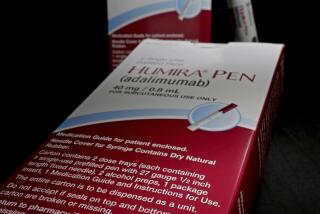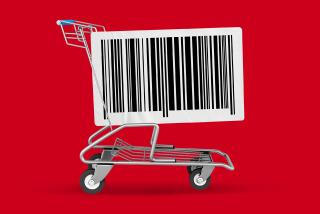Marlboro Price Cut Burns Dow : Discount: Philip Morris shocks investors who had come to rely on the maker of the No. 1 cigarette as a ‘safe’ stock.
- Share via
NEW YORK — Responding to trouble in Marlboro Country, Philip Morris shocked Wall Street and the tobacco industry Friday with word that it will begin deeply discounting the nation’s leading cigarette brand.
Announcement of the move, which will cut an estimated 40% this year from the company’s U.S. tobacco earnings, sent Philip Morris’ stock plunging $14.75 to $49.375 and helped trigger a 68.63 drop in the Dow Jones industrial average. Philip Morris is one of the 30 stocks used to calculate the average.
The action could also lead to an industrywide price war amid signs that lower overall prices have begun to reverse the decline in smoking in the United States.
Analysts said the decision to discount the price of Marlboro cigarettes is a further sign of eroding brand loyalty by smokers and American consumers in general, who are increasingly focusing on price.
In a hastily called New York meeting with tobacco industry analysts, Philip Morris unveiled a strategy meant to strike back at rival companies’ discount brands, which have been selling for as much as 40% less. These generic “black-and-white” brands recently have badly undercut the market share of the industry’s premium brands such as Winston, Salem and Marlboro.
Marlboro is still by far the leading cigarette brand, but it has shown signs of erosion. Its market share declined slightly in 1992 and has begun dropping more rapidly this year, now 22.2% of the domestic market compared to 24.3% at the end of December, company spokesman Nicholas Rolli said.
Philip Morris’ announcement sent the stock price of virtually every other tobacco company plunging and signaled a definitive end to the steady hikes in prices, and profits that for years made tobacco companies “safe” stocks for investors.
“It’s an unmitigated disaster” for the industry, said David A. Goldman, an analyst with Oppenheimer & Co.
Premium brands have had the biggest profit margins, contributing disproportionately to tobacco companies earnings. Analysts said Philip Morris’ profit margin has been about 55 cents per pack, compared to 5 or 6 cents for most discount brands. He said cigarettes are “on their way to becoming a commodity product with no brand identification.”
Philip Morris said it won’t cut the list price of Marlboros but will discount the brand through 2-for-1 promotions, package coupons and other means. It will also hold steady or possibly discount the price of its other premium brands this year. These include Benson & Hedges, Virginia Slims and Merit. The company said it will also push to increase distribution of its own discount brands, such as Cambridge, Alpine and Bristol.
Philip Morris’ move seemed aimed at increasing pressure on its leading rival, RJR/Nabisco Holdings. The Marlboro Man lately has lost ground to RJR’s Joe Camel, as young, image-conscious smokers have moved to the Camel brand. RJR’s business has also been badly hurt by discounting. Its other premium brands, Winston and Salem, mainly appeal to older smokers who have shown increasing willingness to jump to cheaper brands.
Philip Morris’ announcement coincided with RJR’s annual meeting of shareholders Friday in Wilmington, Del. The news angered RJR executives, and co-chairman Lawrence R. Ricciardi said the company would take whatever steps were necessary to remain competitive, although he disclosed no specific countermoves.
RJR’s stock slumped $1.25 to close at $6.75. A Philip Morris spokesman denied that the timing of the announcement was related to the RJR meeting.
Philip Morris declined to say specifically how much the retail price will be reduced through discounting promotions, but said in a statement it will be cut to a level that test marketing showed will lure smokers back to the brand. Rolli said test marketing in Portland, Ore., showed that dropping prices by $4 a carton, or 40 cents a pack, increased Marlboro’s market share by four percentage points.
Cigarette prices vary widely across the country because of differences in state taxes, but Marlboros and other top premium brands on average sell for about $18 or $19 a carton, or $2.30 to $2.50 a pack, compared to about $12, or about 99 cents a pack, for discount brands.
Some analysts and industry consultants said the bold move to recoup market share, while hurting earnings in the short run, may leave financially strong Philip Morris in a more dominant position in the industry.
Ed McQuigg, a former Philip Morris executive who now runs a large Baltimore-based cigarette distributorship, said: “If Philip Morris can pull this off, they will blow off all these generic brands.”
But others, such as Oppenheimer’s Goldman and Tony Regensburg, president of ASR Partners, a tobacco industry consulting firm, said the strategy could backfire.
One worry is that discounting Philip Morris could change the image of its star brand into that of a discount and permanently damage its cachet among brand-conscious smokers.
Where There’s Smoke: Tobacco Stocks Burn Tobacco stocks plunged Friday as Philip Morris Cos. announced that it will begin discounting Marlboro and other premium-brand cigarettes--resulting in a sharp drop in earnings. The Morris move caused a panic among tobacco stock owners, who now fear a major price war will break out--at a time when the government is proposing new cigarette taxes to try and break smokers of the habit. How Morris and other tobacco stocks fared Friday:
Friday close Pct. Stock and change drop Philip Morris 49 3/8, -14 3/4 -23% Brooke Group 1 3/4, -1/2 -22% RJR Nabisco 6 3/4, -1 1/4 -16% Loews Corp. 94, -16 3/8 -15% Universal Corp. 25 3/8, -4 1/8 -14% UST Inc. 26, -3 1/8 -11% Amer. Brands 30, -3 3/4 -11% S&P; 500 index 441.39, -8.91 -2%
All trade on NYSE.
More to Read
Inside the business of entertainment
The Wide Shot brings you news, analysis and insights on everything from streaming wars to production — and what it all means for the future.
You may occasionally receive promotional content from the Los Angeles Times.










